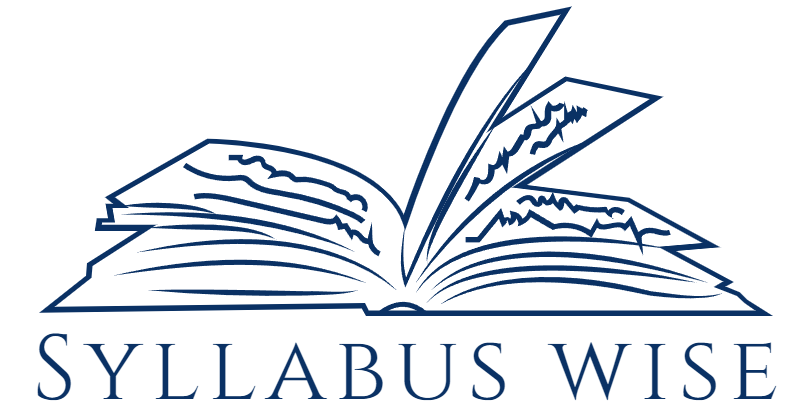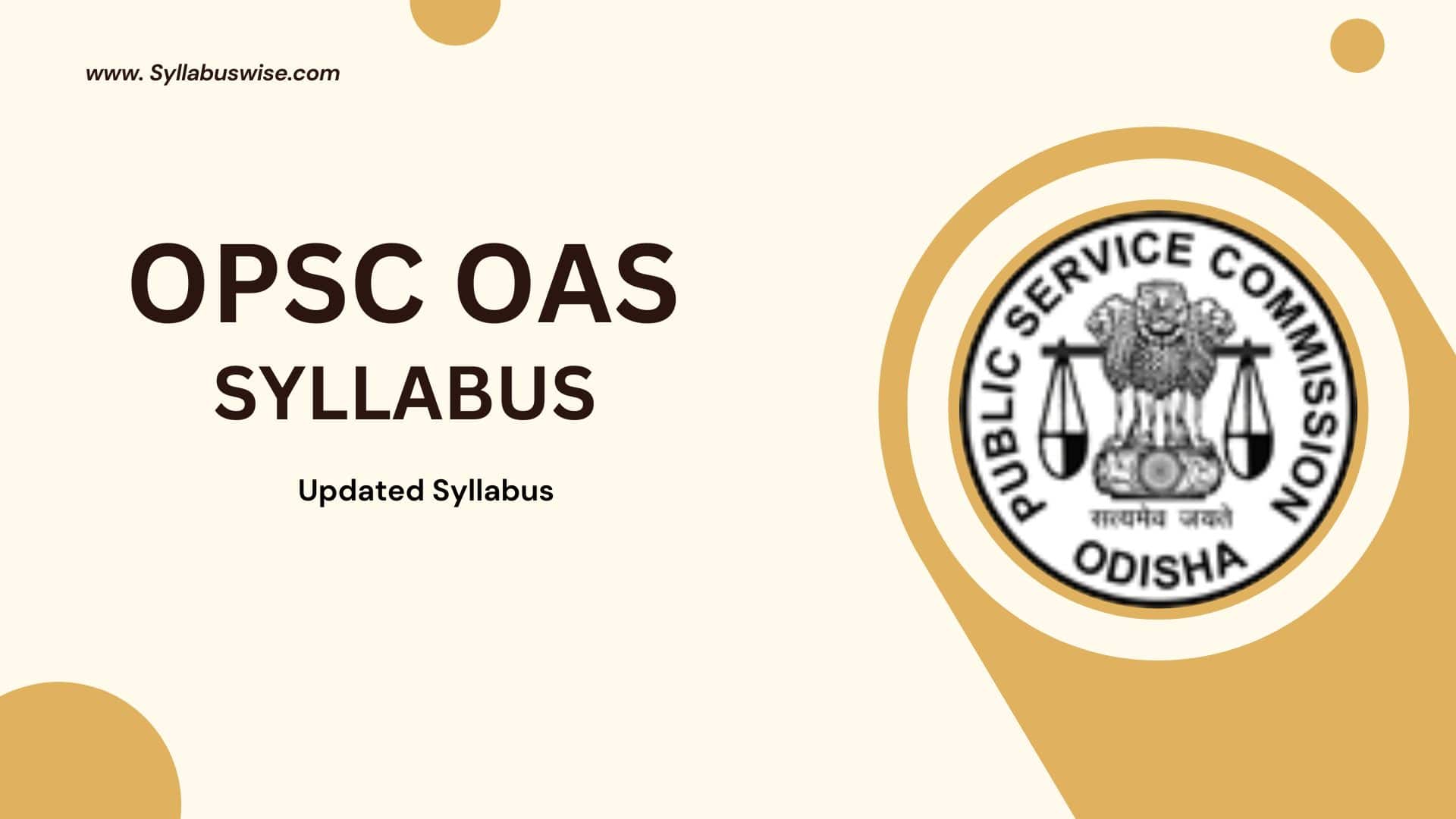Here we are going to give you a compiled OPSC OAS Syllabus in details. Odisha Public Service Commission (OPSC) conducts Odisha Administrative Service (OAS) under Odisha Civil Services on regular interval in Odisha state. The OPSC OAS Syllabus for 2024 is same as OPSC OAS Syllabus 2023, and in official website, syllabus was latest updated on 2022.
OPSC OAS Exam Date:
OPSC has recently announced that the tentative date is 12/09/2024 for the OPSC Civil Service (OAS) prelim exam. To download the notification published on 12th sept 2024 click here.
Syllabi for general Studies-I to IV of Odisha Civil Services (Main written examination)
OPSC OAS Syllabus Paper-I
Candidates may be required to write essays on multiple topics. They will be expected to keep closely to the subject of the essay to arrange their ideas in orderly fashion, and to write concisely. Credit will be given for effective and exact expression.
OPSC OAS Syllabus Paper-II
General Studies-I: Indian Heritage and Culture, Odisha Heritage & Culture, History and Geography of the World & Society Heritage and Culture.
Hertiage and Culture
- Indian culture covering the salient aspects of Art forms, Literature and Architecture from Ancient to Modern times
- Temple Architecture of Odisha.
- Socio-cultural development in Odisha.
- Bhakti Movement in Odisha and its impact on the Society of Odisha.
- Evolution and Growth of Odia Language and Literature and Development of Odia Literature.
History
- Regional Tradition of Odisha Festivals
- Modern Indian history from about the middle of the eighteenth century until the present-significant events, personalities, issues
- The Freedom Struggle its various stages and important contributors/ contributions from different parts of the country.
- Post-independence consolidation and reorganization within the country.
- Kalinga War and its significance
- Dynastic History of Odisha: Mahameghavahan Kharavela, The Bhauma Karas and The Somavamsis, The Gangas and Gajapatis.
- Early Resistance Movements in Odisha- Paik Rebellion, Vir Surendra Sai and the Revolt of 1857.
- Creation of Odisha Province.
- Freedom Movement and Praja Mandal Movements in Odisha; Social bases of Odia Nationalism; Integration of Princely States in Odisha; Social reform movements in Odisha.
Geography of India with special reference to Odisha
- Physical, economic, and social geography of India.
- Important Geophysical phenomena such as earthquakes, Tsunami, Volcanic activity, cyclone, geographical features and their location-changes in critical geographical features (including water-bodies and ice-caps) and in flora and fauna and the effects of such changes.
- Odisha’s natural resources: water, forests & minerals.
- Odisha’s Physiography and Riverine system.
- Salient features of Indian society, Diversity of India and Odisha.
- Role of women and women’s organizations, population and associated issues, poverty and developmental issues, urbanization, their problems, and remedies.
- Effects of globalization on Indian society as a whole and Odisha.
- Distribution and growth of tribes and tribal population in Odisha, Urbanization-Growth of urban population and urban centers in Odisha.
- Social empowerment, communalism, regionalism & secularism.
OPSC OAS Syllabus Paper-III
General Studies-II: Governance, Constitution, Polity, Social Justice and Inter-State Relations
Governance, Constitution, Polity and Inter-state relations
- Indian Constitution- Historical underpinnings, evolution, features, amendments, significant provisions and basic structure.
- Functions and responsibilities of the Union and the States, issues and challenges pertaining to the federal structure, devolution of powers and finances up to local levels, and challenges therein.
- Separation of powers between various organs disputes redressal mechanisms and institutions.
- Comparison of the Indian constitutional scheme with that of other countries.
- Parliament and State legislatures-structure, functioning, conduct of business, powers & privileges and issues arising out of these.
- Structure, organization and functioning of the Executive and the Judiciary Ministries and Departments of the Government; pressure groups and formal/informal associations and their role in the Polity.
- Salient features of the Representation of People’s act, Odisha Right to Public Services Act and Odisha Lokayukta Act.
- Appointment to various Constitutional posts, powers, functions, and responsibilities of various Constitutional bodies.
- Statutory, regulatory, and various quasi-judicial bodies.
- Important aspects of governance, transparency and accountability, e-governance- applications, models, successes, limitations, and potential; citizens charters, transparency & accountability, and institutional and other measures.
- Role of Central and State Civil services in a democracy.
- Panchayati Raj Institution (PRIs) in Odisha.
- Odisha and its neighborhood-relations.
Social Justice
- Government policies and interventions for development in various sectors and issues arising out of their design and implementation- India and Odisha.
- Development processes and the development industry-the role of MSMEs & women SHGs.
- Welfare schemes for vulnerable sections of the population by the State and the performance of these schemes, mechanisms, laws, institutions, and Bodies constituted for the protection and betterment of these vulnerable sections- India and Odisha.
- Issues relating to the development and management of social sector/ Services relating to Health, Education, Human Resources- India and Odisha.
- Issues relating to poverty and hunger-Sustainable Development Goals.
Visit here for the Detailed OPSC PGT Syllabus and exam pattern.
OPSC OAS Syllabus Paper-IV
General Studies-III: Technology, Economic Development, Bio-diversity, Environment, Security and Disaster Management
Science & Technology
- Science and Technology-developments and their applications and effects in everyday life.
- Achievements of Indians in science & technology; Indigenisation of technology and developing new technology.
- Awareness in the fields of IT, Space, Computers, Robotics, Nanotechnology, Bio-technology and issues relating to intellectual property rights.
Economic Development
- Indian Economy and issues relating to planning, mobilization of resources, growth, development and employment.
- Inclusive growth and issues arising from it.
- Government Budgeting-India and Odisha.
- Land reforms in India & Odisha.
- Effects of liberalization on the economy, changes in industrial policy and their effects on industrial growth.
- Infrastructure: Energy, Posts, Roads, Airports, Railways in the Country and Odisha.
- Industrialization in Odisha – Issues and prospects.
Agriculture
- Major cropping patterns in various parts of the country, different types of irrigation and irrigation systems storage, transport and marketing of agricultural produce and issues and related constraints; e-technology in the aid of farmers in India & Odisha.
- Issues related to direct and indirect farm subsidies and minimum support prices; Public Distribution System objectives, functioning, limitations, revamping: issues of buffer stocks and food security, Technology missions, economics of animal-rearing in India & Odisha-Doubling of Farmers’ income.
- Food processing and related industries in India & Odisha scope and significance, location, upstream and downstream requirements, supply chain management
Biodiversity and Environment
- Conservation, environmental pollution and degradation, environmental impact assessment.
- Disaster and Disaster Management in the Country and in Odisha institutions and policies on Disaster Management State
- Linkages between development and spread of extremism. Left wing. extremism in Odisha.
Security and Disaster Management
- Challenges to internal security though communication networks, role of media and social networking sites in internal security challenges, basics of cyber. security, money laundering and its prevention Arts & policies relating to Cyber Security and Money laundering.
- Security challenges and their management in border areas linkages of organized crime with terrorism
- Various Security forces and agencies of the Country and Odisha and their mandate.
Refer to UGC NET Political Science syllabus for Updated NET syllabus
OPSC OAS Syllabus Paper-V
General Studies-IV: Ethics, Integrity and Aptitude
This paper will include questions to test the candidates’ attitudes and approach to issues relating to integrity, probity in public life, and his problem-solving approach to various issues and conflicts faced by him in dealing with society. Questions may utilize the case study approach to determine these aspects. The following broad areas will be covered:
- Ethics and Human Interface: Essence, Determinants and Consequences of Ethics in Human Actions, Dimension of Ethics; Ethics in Private and Public
- Relationships. Human Values – Lessons from the Lives and Teachings of Great Leaders, Reformers and Administrators; Role of Family, Society and Educational Institutions in Inculcating Values
- Attitude: Content, Structure, Function; its Influence and Relation with Thought and Behaviour, Moral and Political Attitudes; Social Influence and Persuasion.
- Aptitude and Foundational Values for Civil Service, Integrity, Impartiality and Non-partisanship, Objectivity, Dedication to Public Service, Empathy, Tolerance and Compassion towards the weaker-sections.
- Emotional Intelligence Concepts, and their Utilities and Application in Administration and Governance
- Contributions of Moral Thinkers and Philosophers from India and World.
- Public/Civil Service Values and Ethics in Public Administration: Status and Problems; Ethical Concerns and Dilemmas in Government and Private Institutions; Laws, Rules, Regulations and Conscience as Sources of Ethical Guidance; Accountability and Ethical Governance; Strengthening of Ethical and Moral Values in Governance; Ethical Issues in International Relations and Funding; Corporate Governance.
- Probity in Governance: Concept of Public Service, Philosophical Basis of Governance and Probity; Information Sharing and Transparency in Government, Right to Information, Codes of Ethics, Codes of Conduct, Citizen’s Charters, Work Culture, Quality of Service Delivery, Utilization of
- Public Funds, Challenges of Corruption.
- Case Studies on above issues.
For the OPSC OAS syllabus pdf download copy of the other Declarations, you can visit https://www.opsc.gov.in/Public/OPSC/Default.aspx


Comments are closed.